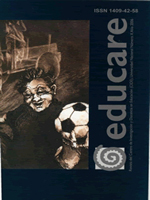La noción de familia de niñas y niños preescolares costarricenses y centroamericanos, en Costa Rica
DOI:
https://doi.org/10.15359/ree.10-1.8Keywords:
cultural diversity, processes, education, familyAbstract
Present research results obtained by the Department of Basic Education of the Department of Basic Education of the Universidad Nacional (CIDE) contribute to understand that factors related with cultural diversity within the classroom do not represent an obstacle in the process of knowledge construction. Acordingly, this study sustains the idea that educators need to comprehend the children’s notion of family as part of the challenge they assume if they are willing to develop a committed approach towards the development of a contextoriented learning process, based on the students’ individual and cultural differences.
References
Aguilar, H. (1997). La magia de compartir con nuestros hijos. Costa Rica: Progreso Editorial.
Anastasi, A. (1982). Tests Psicológicos. Barcelona: Ediciones Españolas.
Arce, D., Carballo, A., Castro, K y Pereira, Z. (2004). La noción de familia que tienen niños costarricenses y extranjeros centroamericanos que asisten a un Jardín Infantil Público. Seminario de Licenciatura no publicado. Universidad Nacional, Heredia, Costa Rica.
Arce, K. (2003). Estudio de necesidades educativas de los inmigrantes nicaragüenses y una propuesta de modelo curricular en la Escuela Santa Isabel, del circuito OI Venecia de la Regional de San Carlos. Tesis de Licenciatura no publicada. Universidad Estatal a Distancia, San José, Costa Rica.
Amaiz, P. (1999). El reto de educar en una sociedad multicultural y desigual. En línea. Disponible en: www.paidos.redins.es/needirectorio/meiu4htm
Azofeifa, F.; Céspedes, E; Monge, M y Vidal M. (2001). Diversidad e Integración Cultural. Heredia: Organización Internacional para los Migrantes, Ministerio de Educación Pública y Universidad Nacional.
Brenes, G. (1999). Estimulación del volumen y características sociodemográficas de los inmigrantes nicaragüenses en Costa Rica. Tesis de Licenciatura no publicada, Universidad de Costa Rica, San José.
Campos, C. y Smith, M. (1991). Técnicas de diagnóstico familiar y comunal. San José, Costa Rica: Editorial Universidad Estatal a Distancia.
Carvajal, R. Y Guang, E. (2003). Compendio de lecturas del curso Psicología de la Familia. Heredia: Universidad Nacional.
Dengo, M. (1995). Educación Costarricense. San José, Costa Rica. Universidad Estatal a Distancia.
Ebanks, E. (1993). Determinantes socioeconómicos de la migración intema. Chile: Centro Latinoamericano de Estadística.
Facultad Latinoamericana de Ciencias Sociales. ( 1999). Amnistía migratoria en Costa Rica. Costa Rica: Facultad Latinoamericana de Ciencias Sociales.
García, F., Pulido, R. y Montes, A. (2002). "La educación multicultural y el concepto de cultura". En: Revista Ibero_americana de Educación. Nº 13. Organización de Estados Iberoamericanos CEI. (En línea). Disponible en: www.oei.org.co/oeivirt/riel.htm.
Gimeno, J. (2001). La educación obligatoria: su sentido educativo y social. Madrid: Ediciones Morata.
Marchesi, A (1992). Desarrollo de los procesos cognitivos en psicología evolutiva y educación preescolar. México: Editorial Santillana.
Mckeman, J. (1999). Investigación-acción y currículum. Madrid: Ediciones Morata.
Meléndez, L. (2000). Educación para la diversidad en una sociedad para el conocimiento. Conferencia impartida en la Universidad Interamericana, "Cómo aprende el ser humano: construyendo ambientes educativos".
MEP/IOM/ AID. (2000-2001). Diversidad e integración cultural. Programa de Educación. la. ed. San José, Costa Rica.
Recasens, J. (2001). Multiculturalidad e interculturalidad. (en línea). Disponible: www.rehue.csociales.uchiled/personales,arecasens/multicult.htm-1 OOk.
Downloads
Published
How to Cite
Issue
Section
License
1. In case the submitted paper is accepted for publication, the author(s) FREELY, COSTLESS, EXCLUSIVELY AND FOR AN INDEFINITE TERM transfer copyrights and patrimonial rights to Universidad Nacional (UNA, Costa Rica). For more details check the Originality Statement and Copyright Transfer Agreement
2. REUTILIZATION RIGHTS: UNA authorizes authors to use, for any purpose (among them selfarchiving or autoarchiving) and to publish in the Internet in any electronic site, the paper´'s final version, both approved and published (post print), as long as it is done with a non commercial purpose, does not generate derivates without previous consentment and recognizes both publisher's name and authorship.
3. The submission and possible publication of the paper in the Educare Electronic Journal is ruled by the Journal’s editorial policies, the institutional rules of Universidad Nacional and the laws of the Republic of Costa Rica. Additionally, any possible difference of opinion or future dispute shall be settled in accordance with the mechanisms of Alternative Dispute Resolution and the Costa Rican Jurisdiction.
4. In all cases, it is understood that the opinions issued are those of the authors and do not necessarily reflect the position and opinion of Educare, CIDE or Universidad Nacional, Costa Rica. It is also understood that, in the exercise of academic freedom, the authors have carried out a rogorous scientific-academic process of research, reflection and argumentation thar lays within the thematic scope of interest of the Journal.
5. The papers published by Educare Electronic Journal use a Creative Commons License:














 The articles published by Educare Electronic Journal can be shared with a Creative Commons License:
The articles published by Educare Electronic Journal can be shared with a Creative Commons License: 



